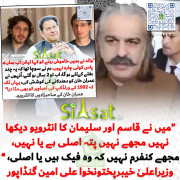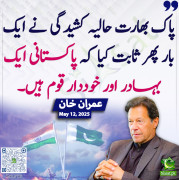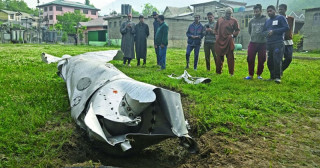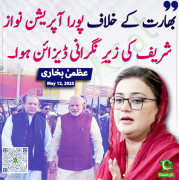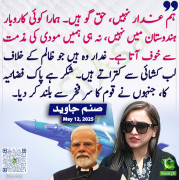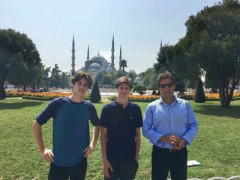MileStone
MPA (400+ posts)
The Epistemological Importance of Dreams and
Visions in Islam
Visions in Islam
The Qurā informs us that Allah Most High inflicts
(epistemological) punishment on the disbelievers by sealing their
hearts, and their hearing, and by placing veils before their eyes
(epistemological) punishment on the disbelievers by sealing their
hearts, and their hearing, and by placing veils before their eyes
(Qurān, al-Baqara, 2:7)
. Such people consequently have dead
hearts and can see with only their external eyes. They can acquire
knowledge only from observation and from what is known as
scientific enquiry. They are incapable of accessing knowledge
internally or spiritually in the form internal insight or through true
(i.e., prophetic) dreams and visions.
Dreams and visions belong to the realm of the human heart, and
give knowledge that allows us to probe into the very depths of human
nature and conduct. True (or prophetic) dreams and visions are divine
hearts and can see with only their external eyes. They can acquire
knowledge only from observation and from what is known as
scientific enquiry. They are incapable of accessing knowledge
internally or spiritually in the form internal insight or through true
(i.e., prophetic) dreams and visions.
Dreams and visions belong to the realm of the human heart, and
give knowledge that allows us to probe into the very depths of human
nature and conduct. True (or prophetic) dreams and visions are divine
gifts
to the heart, and they come only when the heart is sound, healthy,
innocent, and saturated with the substance of religion, i.e., faith (al-
Imān) in Allah Most High. Those who are spiritually alive can be
blessed with true dreams and visions through which sacred
knowledge can be communicated. They can receive inner knowledge
of events that would occur in the future, and when the events do occur
they validate such visions. They can also receive warnings in dreams,
and when they have the good sense to heed such warnings they can
avert disasters.
innocent, and saturated with the substance of religion, i.e., faith (al-
Imān) in Allah Most High. Those who are spiritually alive can be
blessed with true dreams and visions through which sacred
knowledge can be communicated. They can receive inner knowledge
of events that would occur in the future, and when the events do occur
they validate such visions. They can also receive warnings in dreams,
and when they have the good sense to heed such warnings they can
avert disasters.
Other dreams, such as nightmares, represent
attacks on the heart
that seek to mislead, deceive and corrupt the heart. Such dreams can
also function as a means through which the heart can be troubled,
tormented and thrown into a state of dysfunction.
Finally there are still other dreams that function either as
that seek to mislead, deceive and corrupt the heart. Such dreams can
also function as a means through which the heart can be troubled,
tormented and thrown into a state of dysfunction.
Finally there are still other dreams that function either as
medicine
for the heart, or are windows to the heart that allow us to see
our own hearts, and thus ourselves, however much it may please or
dismay us to see ourselves as we truly are.
We live, today, in a world that is so filled with corruption and
godlessness that the overwhelming majority of mankind, including
many Muslims, cannot see with their internal eye. Most people no
longer understand that the only time anyone can be certain of the
validity of what he claims to see internally, is when he sees true
dreams and visions! Indeed there are many so-called believers in
todays strange world who are actually skeptical of knowledge that is
internally received and who show no interest in the quest for internal
vision.
The religious mind that harbors such skepticism is new to this
our own hearts, and thus ourselves, however much it may please or
dismay us to see ourselves as we truly are.
We live, today, in a world that is so filled with corruption and
godlessness that the overwhelming majority of mankind, including
many Muslims, cannot see with their internal eye. Most people no
longer understand that the only time anyone can be certain of the
validity of what he claims to see internally, is when he sees true
dreams and visions! Indeed there are many so-called believers in
todays strange world who are actually skeptical of knowledge that is
internally received and who show no interest in the quest for internal
vision.
The religious mind that harbors such skepticism is new to this
ummah
(religious community) and has emerged as a consequence of
the impact of the secularization of thought and knowledge by todays
dominant western materialist civilization. That secularism paved the
way for metaphysical materialism and for the epistemological attack
on internal spiritual knowledge, and eventually gave birth to a new
religion called humanism. It is based on the scientific method and
rationalism, and is distinctly uncomfortable with all that relates to
transcendental experience. The true dream is most certainly a
transcendental experience!
the impact of the secularization of thought and knowledge by todays
dominant western materialist civilization. That secularism paved the
way for metaphysical materialism and for the epistemological attack
on internal spiritual knowledge, and eventually gave birth to a new
religion called humanism. It is based on the scientific method and
rationalism, and is distinctly uncomfortable with all that relates to
transcendental experience. The true dream is most certainly a
transcendental experience!
It is by design, and not by accident, that the modern godless age
has relegated the phenomenon of
has relegated the phenomenon of
true (oe prophetic) dreams to the
obscurity of an academic and intellectual museum. This is because the
obscurity of an academic and intellectual museum. This is because the
true
dream cannot be explained using the western epistemology that
programs mankind to be skeptical of the validity of knowledge from
any source that transcends scientific observation. The diabolically
cunning western method is to seek a natural (scientific) explanation
for religious experiences such as true dreams.
The phenomenon of true dreams has presented the Muslim, on
the other hand, with a heaven-sent opportunity for demonstrating the
validity of Islams epistemology and consequent spiritual
interpretation of reality, the universe and human nature. Yet, apart
from the rare, authentic and erudite Sufi master, of the likes of Dr.
Muhammad Iqbal, Muslim scholars living in this modern age of the
ascendancy of the West have not produced, from an Islamic
psychological perspective, any theoretical work on the phenomenon of
dreams. Work is being done by scholars trained in western psychology
(i.e., psychology as a discipline which was developed by western
secular civilization), but because they are operating in a completely
secular scientific framework they cannot comprehend the nature of
this phenomenon.
We wish to pose the question: Why has this great opportunity for
using true dreams as a means of demolishing the western
epistemology been missed by Islamic scholarship and by the so-called
great contemporary Islamic reform movements? Iqbal has observed
that religious thought in Islam has been practically stationary during
the last five hundred years (Muhammad Iqbal: Reconstruction of
programs mankind to be skeptical of the validity of knowledge from
any source that transcends scientific observation. The diabolically
cunning western method is to seek a natural (scientific) explanation
for religious experiences such as true dreams.
The phenomenon of true dreams has presented the Muslim, on
the other hand, with a heaven-sent opportunity for demonstrating the
validity of Islams epistemology and consequent spiritual
interpretation of reality, the universe and human nature. Yet, apart
from the rare, authentic and erudite Sufi master, of the likes of Dr.
Muhammad Iqbal, Muslim scholars living in this modern age of the
ascendancy of the West have not produced, from an Islamic
psychological perspective, any theoretical work on the phenomenon of
dreams. Work is being done by scholars trained in western psychology
(i.e., psychology as a discipline which was developed by western
secular civilization), but because they are operating in a completely
secular scientific framework they cannot comprehend the nature of
this phenomenon.
We wish to pose the question: Why has this great opportunity for
using true dreams as a means of demolishing the western
epistemology been missed by Islamic scholarship and by the so-called
great contemporary Islamic reform movements? Iqbal has observed
that religious thought in Islam has been practically stationary during
the last five hundred years (Muhammad Iqbal: Reconstruction of
Religious Thought in Islam, Lahore. Institute of Islamic Culture, 1986, p.
6).
6).
This is a statement that should truly alarm Muslims and jolt their
minds into enquiring into the cause of this intellectual lethargy in our
religious thought. Our view is that a scientific, modernist and
Protestant version of Islam emerged as a consequence of the
intellectual impact of the western colonial rule over Muslims. This
modernist Islam was the child of the very western epistemology that
invalidated knowledge from any source beyond scientific observation.
This Islam that was shorn of its spiritual heart emerged in Saudi
Arabia in the form of the
minds into enquiring into the cause of this intellectual lethargy in our
religious thought. Our view is that a scientific, modernist and
Protestant version of Islam emerged as a consequence of the
intellectual impact of the western colonial rule over Muslims. This
modernist Islam was the child of the very western epistemology that
invalidated knowledge from any source beyond scientific observation.
This Islam that was shorn of its spiritual heart emerged in Saudi
Arabia in the form of the
Wahhabi movement and proceeded to launch
a fierce and relentless attack on Sufism. In the process it unwittingly
threw out the baby with the bath-water.
Now we recognize that Sufism had lost its intellectual dynamism
and creativity and, like everything else in Islamic civilization, was in a
state of drift. Iqbal took note of that failure in a scathing passage in
the famous work from which we have been quoting:
a fierce and relentless attack on Sufism. In the process it unwittingly
threw out the baby with the bath-water.
Now we recognize that Sufism had lost its intellectual dynamism
and creativity and, like everything else in Islamic civilization, was in a
state of drift. Iqbal took note of that failure in a scathing passage in
the famous work from which we have been quoting:
The technique of medieval mysticism by which religious life, in its higher
manifestations, developed itself both in the East and in the West, has now
practically failed. And in the Muslim East it has, perhaps, done far greater
havoc than anywhere else. Far from reintegrating the forces of the average
mans inner life, and thus preparing him for participation in the march of
history, it has taught him a false renunciation and made him perfect ly
contented with his ignorance and spiritual thraldom.
(Iqbal, Op. Cit. p. 148-9)
manifestations, developed itself both in the East and in the West, has now
practically failed. And in the Muslim East it has, perhaps, done far greater
havoc than anywhere else. Far from reintegrating the forces of the average
mans inner life, and thus preparing him for participation in the march of
history, it has taught him a false renunciation and made him perfect ly
contented with his ignorance and spiritual thraldom.
(Iqbal, Op. Cit. p. 148-9)
The enlightened student of Iqbal,
Maulana Dr. F. R. Ansari, also
noted the degeneration in Sufism, but warned against throwing away
the baby with the bath-water:
noted the degeneration in Sufism, but warned against throwing away
the baby with the bath-water:
With the awful degeneration of Muslim society, due to certain historical
factors well-known to students of Islamic history, the understanding as well
as the practice of
factors well-known to students of Islamic history, the understanding as well
as the practice of
Tasawwuf also has degenerated in more dimensions than
one. Also its name has been misused for certain wrong notions and ideas in
certain quarters. In spite of that, however, the denial of the Islamic religious
quest (i.e., Tasawwuf) of its rightful place amounts to the very negation of
Islam. Also, interpreting Tasawwuf in terms of mysticism projected by other
religions is a flagrant violation of Truth.
(Ansari: The Quranic Foundations and Structure of Muslim Society.
World Federation of Islamic Missions. Karachi. Vol. 1. p. 152 fn)
one. Also its name has been misused for certain wrong notions and ideas in
certain quarters. In spite of that, however, the denial of the Islamic religious
quest (i.e., Tasawwuf) of its rightful place amounts to the very negation of
Islam. Also, interpreting Tasawwuf in terms of mysticism projected by other
religions is a flagrant violation of Truth.
(Ansari: The Quranic Foundations and Structure of Muslim Society.
World Federation of Islamic Missions. Karachi. Vol. 1. p. 152 fn)
Sufism suffered the fate of being hijacked by professional
opportunists who introduced devient practices through which they
established veritable spiritual serfdoms. But in the process of waging a
Don Quixote struggle to purge Islamic beliefs and practices of all that
was perceived as
opportunists who introduced devient practices through which they
established veritable spiritual serfdoms. But in the process of waging a
Don Quixote struggle to purge Islamic beliefs and practices of all that
was perceived as
Sufi bidah (innovations), the modernist so-called
revivalist Islamic movement acted as a Trojan horse within the body
of Islam allowing the western epistemology to penetrate Islamic
thought. The baby was thrown out with the bath-water! A
secularized sanitized version of Islam was then declared to be Islamic
revivalism. The so-called great Islamic reform movements proceeded
to establish centers of learning and to produce large numbers of
scholars who were intellectually incapable of responding to the
profoundly dangerous epistemological attack on Islamic scholarship
and thought, since they were themselves trapped in western
epistemology. Worse than that, their zealotry and misguided attack on
even authentic Sufism resulted in such inner damage to their own
revivalist Islamic movement acted as a Trojan horse within the body
of Islam allowing the western epistemology to penetrate Islamic
thought. The baby was thrown out with the bath-water! A
secularized sanitized version of Islam was then declared to be Islamic
revivalism. The so-called great Islamic reform movements proceeded
to establish centers of learning and to produce large numbers of
scholars who were intellectually incapable of responding to the
profoundly dangerous epistemological attack on Islamic scholarship
and thought, since they were themselves trapped in western
epistemology. Worse than that, their zealotry and misguided attack on
even authentic Sufism resulted in such inner damage to their own
spirituality that they themselves were now rendered incapable of ever
being blessed by Allah Most High with continuous
being blessed by Allah Most High with continuous
true dreams and
visions.
But long before the modern materialist West impacted on
religious thought by secularizing it, the world of Islam had
experienced the same phenomenon in the emergence of the
visions.
But long before the modern materialist West impacted on
religious thought by secularizing it, the world of Islam had
experienced the same phenomenon in the emergence of the
Muatazilite
school of religious thought. Iqbal described that event:
The Muatazilah, conceiving religion merely as a body of religious doctrines
and ignoring it as a vital fact, took no notice of non-conceptual modes of
approaching Reality and reduced religion to a mere system of logical
concepts ending in a purely negative attitude. They failed to see that in the
domain of knowledge - scientific or religious - complete independence of
thought from concrete experience is not possible. (Iqbal is here referring to
religious experience, among other things, and religious experience includes
true dreams).
(Iqbal, op. cit. p. 4)
and ignoring it as a vital fact, took no notice of non-conceptual modes of
approaching Reality and reduced religion to a mere system of logical
concepts ending in a purely negative attitude. They failed to see that in the
domain of knowledge - scientific or religious - complete independence of
thought from concrete experience is not possible. (Iqbal is here referring to
religious experience, among other things, and religious experience includes
true dreams).
(Iqbal, op. cit. p. 4)
It was the genius of Dr. Muhammad Iqbal that he was able to
distinguish authentic Sufism from its deviations. It was his genius that
he succeeded in articulating the
distinguish authentic Sufism from its deviations. It was his genius that
he succeeded in articulating the
Sufi epistemology in a manner which
demolished the considerable objections of many of the secularlyeducated
scientific modernists in the modern West as well as in the
Muslim world. Had Dr. Muhammad Iqbal studied Islam at Al-Azhar
demolished the considerable objections of many of the secularlyeducated
scientific modernists in the modern West as well as in the
Muslim world. Had Dr. Muhammad Iqbal studied Islam at Al-Azhar
University in Egypt or at the Deoband or other Islamic seminaries in
India, he would never have emerged as the great scholar and sage that
he was. And the reason for this was not limited to his own natural
talent but also to the epistemology which he inherited from authentic
Sufism, an epistemology which modernist Islam could never deliver.
India, he would never have emerged as the great scholar and sage that
he was. And the reason for this was not limited to his own natural
talent but also to the epistemology which he inherited from authentic
Sufism, an epistemology which modernist Islam could never deliver.
Secular Europes scientific method differed from the scientific
method that reached Europe from Muslim Spain. What
Judeo-Christian secular Europe did was to establish a new dogmatic
religion which claimed only that which could be
method that reached Europe from Muslim Spain. What
Judeo-Christian secular Europe did was to establish a new dogmatic
religion which claimed only that which could be
observed could be the
subject of a scientific enquiry. The new dogmatic religion thus
fostered habits of concrete thought that negated the very substance and
life-blood of religion, i.e., belief in al-Ghaib or the unseen world, and
direct experience of that unseen world in the miracle of the Qurā.
Europe proceeded to establish a basic dogma, i.e., the audacious
claim that only scientific knowledge was real knowledge, while all
else were akin to fairy-tales. And so, the modern religious mind in
Europe slowly closed its doors to religious experience and to the
study of such phenomena. The true dream is a religious experience.
William James, however, has done an extremely useful service to
religious thought in producing his classical work, Varieties of
Religious Experience, in which the true dream has pride of place.
What possible scientific method could there be for examining the
phenomenon of a true dream? Here, for example, is what a true dream
can be: Last night I dreamt that my neighbors house was on fire. This
morning it was burnt down.
subject of a scientific enquiry. The new dogmatic religion thus
fostered habits of concrete thought that negated the very substance and
life-blood of religion, i.e., belief in al-Ghaib or the unseen world, and
direct experience of that unseen world in the miracle of the Qurā.
Europe proceeded to establish a basic dogma, i.e., the audacious
claim that only scientific knowledge was real knowledge, while all
else were akin to fairy-tales. And so, the modern religious mind in
Europe slowly closed its doors to religious experience and to the
study of such phenomena. The true dream is a religious experience.
William James, however, has done an extremely useful service to
religious thought in producing his classical work, Varieties of
Religious Experience, in which the true dream has pride of place.
What possible scientific method could there be for examining the
phenomenon of a true dream? Here, for example, is what a true dream
can be: Last night I dreamt that my neighbors house was on fire. This
morning it was burnt down.
Islams explanation of a
true dream is events exist in an unseen
world before they occur in this world. And so the fire existed in an
unseen world from whence the information was transmitted by angels
in a dream before the fire actually occurred in this world.
This experience of a true dream cannot possibly be the subject of
a scientific enquiry because secular western psychology, operating
with the new scientific method, cannot transcend observable
world before they occur in this world. And so the fire existed in an
unseen world from whence the information was transmitted by angels
in a dream before the fire actually occurred in this world.
This experience of a true dream cannot possibly be the subject of
a scientific enquiry because secular western psychology, operating
with the new scientific method, cannot transcend observable
phenomena
. Freud was the perfected product of the new scientific
thinking and he consequently made a futile effort to locate a natural
explanation for the phenomenon of true dreams.
It is precisely because of the great danger posed by the new
western epistemology and the scientific religion which emerges from
that epistemology that Iqbal began his great work, The
Reconstruction of Religious Thought in Islam with two very
powerfully written chapters on Knowledge and Religious Experience
thinking and he consequently made a futile effort to locate a natural
explanation for the phenomenon of true dreams.
It is precisely because of the great danger posed by the new
western epistemology and the scientific religion which emerges from
that epistemology that Iqbal began his great work, The
Reconstruction of Religious Thought in Islam with two very
powerfully written chapters on Knowledge and Religious Experience
and
The Philosophical Test of the Revelations of Religious
Experience. He followed them later with another chapter entitled: Is
Religion Possible?
Experience. He followed them later with another chapter entitled: Is
Religion Possible?
Iqbal made a valiant effort to respond to the challenge posed by
modernist Islam in its rejection of religious experience as a source of
knowledge. He began his work by addressing the subject in the
Preface of the book itself. We quote him at length so that those who
may be unfamiliar with his thought, or hitherto incapable of
understanding him, may now be encouraged to study his great work:
modernist Islam in its rejection of religious experience as a source of
knowledge. He began his work by addressing the subject in the
Preface of the book itself. We quote him at length so that those who
may be unfamiliar with his thought, or hitherto incapable of
understanding him, may now be encouraged to study his great work:
The Qur
ān is a book which emphasizes deed rather than idea. There
are, however, men to whom it is not possible organically to assimilate an
alien universe by re-living, as a vital process, that special type of inner
experience on which religious faith ultimately rests. Moreover, modern man,
by developing habits of concrete thought - habits which Islam itself fostered
at least in the earlier stages of its cultural career - has rendered himself less
capable of that experience which he further suspects because of its liability to
illusion. The more genuine schools of Sufism have, no doubt, done good
work in shaping and directing the evolution of religious experience in Islam;
but their latter-day representatives, owing to their ignorance of the modern
mind, have become absolutely incapable of receiving any fresh inspiration
from modern thought and experience. They are perpetuating methods which
are, however, men to whom it is not possible organically to assimilate an
alien universe by re-living, as a vital process, that special type of inner
experience on which religious faith ultimately rests. Moreover, modern man,
by developing habits of concrete thought - habits which Islam itself fostered
at least in the earlier stages of its cultural career - has rendered himself less
capable of that experience which he further suspects because of its liability to
illusion. The more genuine schools of Sufism have, no doubt, done good
work in shaping and directing the evolution of religious experience in Islam;
but their latter-day representatives, owing to their ignorance of the modern
mind, have become absolutely incapable of receiving any fresh inspiration
from modern thought and experience. They are perpetuating methods which
were created for generations possessing a cultural outlook differing, in many
important respects, from our own. Your creation and your resurrection,
says the Qur
important respects, from our own. Your creation and your resurrection,
says the Qur
ān, are like the creation and resurrection of a single soul. A
living experience of the kind of biological unity embodied in this verse
requires today a method physiologically less violent and psychologically
more suitable to a concrete type of mind. In the absence of such a method the
demand for a scientific form of religious knowledge is only natural.
(Muhammad Iqbal: Reconstruction of Religious Thought in
Islam, Lahore, Institute of Islamic Culture, 1986. p. v)
living experience of the kind of biological unity embodied in this verse
requires today a method physiologically less violent and psychologically
more suitable to a concrete type of mind. In the absence of such a method the
demand for a scientific form of religious knowledge is only natural.
(Muhammad Iqbal: Reconstruction of Religious Thought in
Islam, Lahore, Institute of Islamic Culture, 1986. p. v)
If ever there was a impregnable defense of the
Sufi
epistemology articulated in the idiom of modern thought, Iqbal
accomplished it. The tragedy since 1938, when Iqbals work was
published, is that contemporary Islamic scholarship which has
emerged from the scientific Protestant version of Islam has been
intellectually incapable of even understanding these three chapters of
Iqbals great work.
Iqbal took up the challenge and argued the case for the
epistemological validity of intuitive knowledge and experience. He
declared:
accomplished it. The tragedy since 1938, when Iqbals work was
published, is that contemporary Islamic scholarship which has
emerged from the scientific Protestant version of Islam has been
intellectually incapable of even understanding these three chapters of
Iqbals great work.
Iqbal took up the challenge and argued the case for the
epistemological validity of intuitive knowledge and experience. He
declared:
. . . Nor is there any reason to suppose that thought and intuition are
essentially opposed to each other. They spring up from the same root and
complement each other. The one grasps Reality piecemeal, the other grasps
it in its wholeness. The one fixes its gaze on the eternal, the other on the
temporal aspect of reality. The one is present enjoyment of the whole of
Reality; the other aims at traversing the whole by slowly specifying and
closing up the various regions of the whole for exclusive observation. Both
are in need of each other for mutual rejuvenation. Both seek visions of the
same Reality which reveals itself to them in accordance with their function in
essentially opposed to each other. They spring up from the same root and
complement each other. The one grasps Reality piecemeal, the other grasps
it in its wholeness. The one fixes its gaze on the eternal, the other on the
temporal aspect of reality. The one is present enjoyment of the whole of
Reality; the other aims at traversing the whole by slowly specifying and
closing up the various regions of the whole for exclusive observation. Both
are in need of each other for mutual rejuvenation. Both seek visions of the
same Reality which reveals itself to them in accordance with their function in
life. In fact, intuition, as Bergson rightly says, is only a higher kind of
intellect.
(Muhammad Iqbal: Reconstruction of Religious
Thought in Islam, Lahore, Institute of Islamic Culture, 1986. p. 2)
intellect.
(Muhammad Iqbal: Reconstruction of Religious
Thought in Islam, Lahore, Institute of Islamic Culture, 1986. p. 2)
It should also be a matter of great significance to our skeptical
readers that the Qurā itself has chosen to commence its guidance to
humanity by insisting, at the very beginning,
readers that the Qurā itself has chosen to commence its guidance to
humanity by insisting, at the very beginning,
(Qurān, al-Baqarah,
2:1) that religious faith is essentially constructed on belief in that
which lies beyond our normal observation, - i.e., beyond the world of
concrete thought (al-ghaib)! True dreams belong to that world.
Indeed the most profound experience in the life of the Prophet
Muhammad (sallalahu alaihi wa sallam) was a nocturnal journey (not a
dream) into that unseen world, - a journey on which he was taken in
order that he might have direct experience of the transcendental world.
Thus the Qurā declares:
2:1) that religious faith is essentially constructed on belief in that
which lies beyond our normal observation, - i.e., beyond the world of
concrete thought (al-ghaib)! True dreams belong to that world.
Indeed the most profound experience in the life of the Prophet
Muhammad (sallalahu alaihi wa sallam) was a nocturnal journey (not a
dream) into that unseen world, - a journey on which he was taken in
order that he might have direct experience of the transcendental world.
Thus the Qurā declares:
He surely saw the greatest of the Signs of his Lord.
(Qurā: al-Najm:- 53:18)
(Qurā: al-Najm:- 53:18)
Knowledge must be de-secularized if religious Truth is to be
allowed to play the role which only Truth can play. That role is one of
restoring human society to the beliefs and values of authentic religion
which alone can anchor mankind in a life of peace, happiness,
fulfillment and success.
In order for knowledge to be desecularized we need to
demonstrate the existence in this world of knowledge that has come
allowed to play the role which only Truth can play. That role is one of
restoring human society to the beliefs and values of authentic religion
which alone can anchor mankind in a life of peace, happiness,
fulfillment and success.
In order for knowledge to be desecularized we need to
demonstrate the existence in this world of knowledge that has come
from
al-Ghaib, i.e., an unseen world and a source which thus
transcends normal experience. Only when knowledge has been
desecularized can the modern mind apply itself seriously to restoring
the life of the sacred. The late outstanding Islamic scholar, Ismail
Faruqi who (like Saudi Arabias King Faisal, Pakistans President
Ziaul Haq, Panamas President Omar Torrejo, Ecuadors Jamie
Roldos, Chiles Salvador Allende, etc.) fell to an act of terrorism long
before those terrorists launched their own so-called war on terror,
attempted to desecularize knowledge. Unfortunately he coined the
term Islamization of Knowledge and in doing so the essential goal of
transcends normal experience. Only when knowledge has been
desecularized can the modern mind apply itself seriously to restoring
the life of the sacred. The late outstanding Islamic scholar, Ismail
Faruqi who (like Saudi Arabias King Faisal, Pakistans President
Ziaul Haq, Panamas President Omar Torrejo, Ecuadors Jamie
Roldos, Chiles Salvador Allende, etc.) fell to an act of terrorism long
before those terrorists launched their own so-called war on terror,
attempted to desecularize knowledge. Unfortunately he coined the
term Islamization of Knowledge and in doing so the essential goal of
desecularizing knowledge
was rendered obscure to those who
inherited his noble mission in the cause of Truth.
A serious study on the phenomenon of dreams by an erudite
Muslim psychologist can make a significant contribution towards
de-secularizing knowledge and redirecting thought to the recognition
of the primacy of the sacred, and to the understanding of the essential
harmony in the relationship between material form and spiritual
inherited his noble mission in the cause of Truth.
A serious study on the phenomenon of dreams by an erudite
Muslim psychologist can make a significant contribution towards
de-secularizing knowledge and redirecting thought to the recognition
of the primacy of the sacred, and to the understanding of the essential
harmony in the relationship between material form and spiritual
substance in the external universe and the human world. Further
Islamic scholarship of the quality and caliber of Dr. Muhammad Iqbal
is required for undertaking a study on
Islamic scholarship of the quality and caliber of Dr. Muhammad Iqbal
is required for undertaking a study on
the metaphysics of the true
dream.






